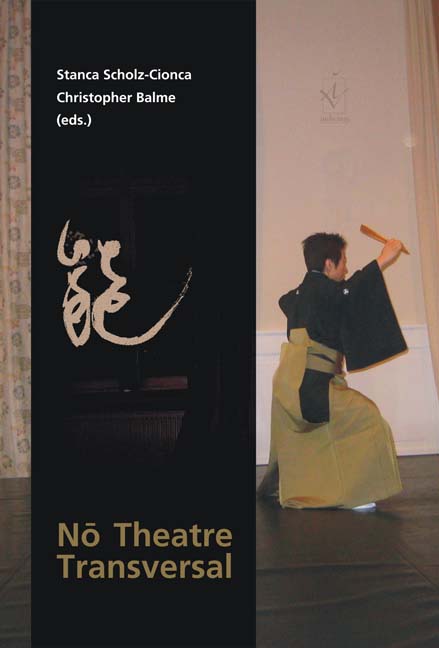Japan und Ostasien
Germanistik /
Deutsch als Fremdsprache
Kulinaristik
Kulturwissenschaften
|
 |
Senden Sie Fragen oder Kommentare zu dieser Website an:
info@iudicium.de
iudicium verlag
Dauthendeystr. 2 · 81377 München
Deutschland
Copyright · 2024
|
|
| |
|
 Scholz-Cionca,
Stanca / Balme, Christopher (eds.) Scholz-Cionca,
Stanca / Balme, Christopher (eds.)
Nō
Theatre Transversal
2008 · ISBN 978-3-89129-797-1
· 238 S., kt. · EUR 25,—
Nō is the Japanese theatre form that has had the most
profound influence on the Western stage, especially on its experimental and
avantgarde forms. The list of writers and directors who studied nō,
whether as texts, or in performance, reads like a Who's Who of Western
modernism. But nō itself, confronted by modernity and shaken by
identity crises, has oscillated between extreme conservatism on the one hand
and periods of openness and renewal on the other. This volume, which is
based on the international symposium Nō Theatre Transversal held in
Trier in 2006, investigates these complex phenomena of inter- and
transcultural entwinement. Combining historical, theoretical and practical
perspectives, the book and its authors provide a unique, interdisciplinary
approach and an international perspective on a fascinating theatrical form.
TABLE OF CONTENTS:
Christopher Balme and Stanca Scholz-Cionca: Introduction
· Kagaya Shinko: Dancing on a moving train: Nō between two wars · Mae
J. and Richard J. Smethurst: Two new nō plays written during World
War II · James R. Brandon: New plays in wartime: Nō and kabuki
· Eike Grossmann: Under the burden of nō: Community life in Kurokawa
and ritual nō performances · Takemoto Mikio: On the principle of
jo-ha-kyū in contemporary nō theatre · Yamanaka Reiko: What
features distinguish nō from other performing arts? · Kasai Ken’ichi:
New plays (shinsaku nō) as an engine of renewal. From the experiments
of Mei no kai to the staging of Shiranui · Talking with
Umewaka Rokurō Performing shinsaku nō · Oda Sachiko: On the
characteristics of newly composed nō plays (shinsaku nō) ·
Barbara Geilhorn: Between self-empowerment and discrimination: Women in
nō today · Uzawa Hisa: Reflections on performing for the international
nō symposium · Okamoto Akira: The actor’s body in nō and
contemporary theatre. On the work of Ren’niku Kōbō · Richard Emmert:
English nō and Theatre Nohgaku – the how and the why · Libby Zilber:
Yugen for western audiences · Peter Eckersall: ‘Mistook sign’ – Australian
responses to nō · Hans-Peter Bayerdörfer: Between poetry and ‘théâtre
lyrique’: Nō and the boundaries of genre · Christopher Balme: ‘Too
Close for Comfort’: Benjamin Britten’s Curlew River and the reception
of nō after 1945 · Juliane Weigel: Interculturality or exoticism?
Music and dramatic structure in the opera Silkkirumpu based on the
nō Aya no tsuzumi · Helen S. E. Parker: Crossing borders in the
presentation of nō through multimedia
|
|
|
|
